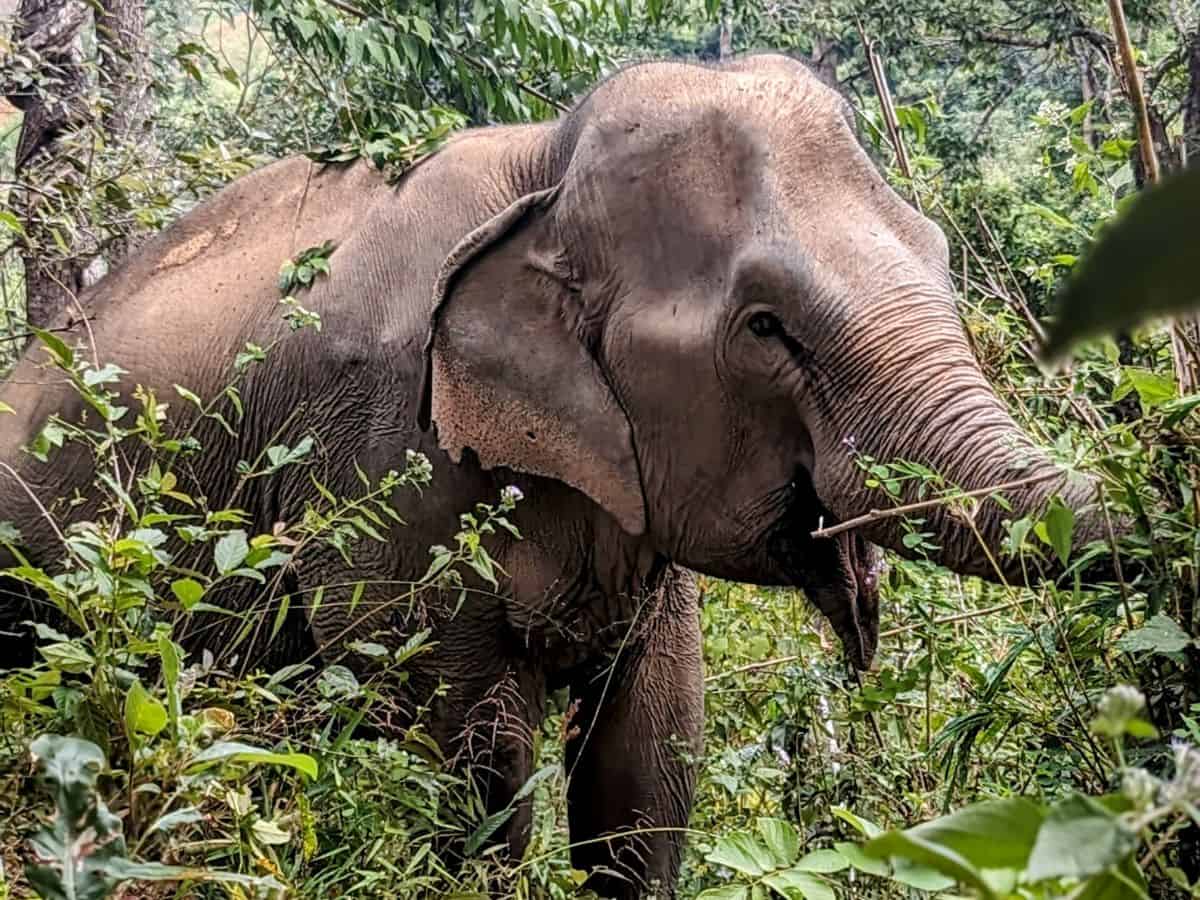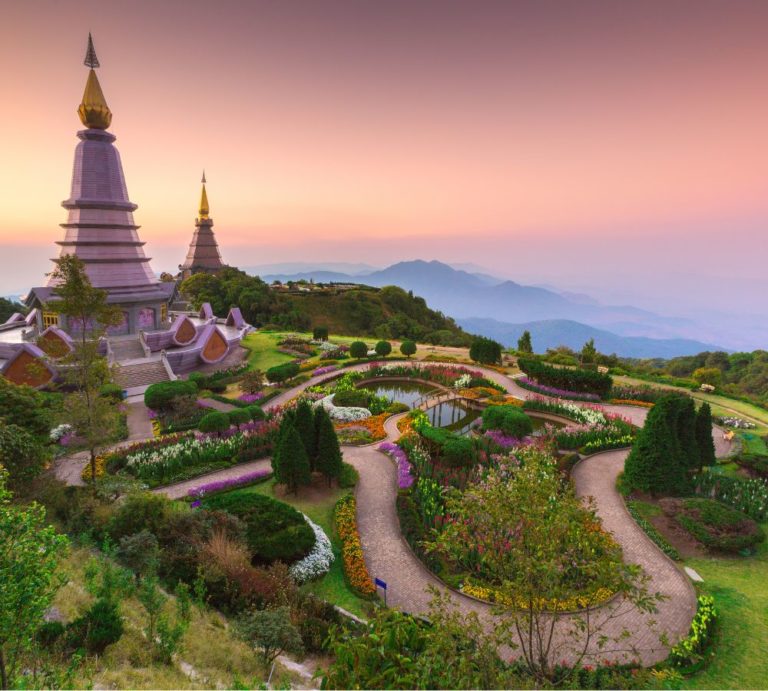7 Ethical Elephant Sanctuaries in Thailand
We live in a world where glitzy and misleading marketing can make it really difficult to assess if something is cruel from behind our computer screens. When I was planning our first vegan tour to Thailand, I’m not kidding when I say I lost sleep over planning where we’d visit. Luckily, I have excellent partners with the same viewpoints as I do regarding wildlife activities. That eased much of the burden, but I know that’s not the case for most travelers hoping to see these gentle giants on their vacation. So, if you’re planning your own vacation, you’re probably wondering which elephant sanctuaries in Thailand are ethical.
And how do you determine who’s a friend and a foe? Well, let’s get into that and more!
Ethical Elephant Sanctuaries in Thailand to Visit
All of these sanctuaries are partners of World Animal Protection and operate in the best interest of elephants. One thing is abundantly clear: they are all run by people who genuinely care about the work they are doing. You will support a wonderful organization and team no matter which you choose to visit. In addition to the elephants, many also rescue other animals, such as dogs, and support their local communities.
Burm and Emily’s Elephant Sanctuary (BEES)
Chiang Mai
Located in the picturesque Mae Chaem district, about a 2.5-hour drive from Chiang Mai, the sanctuary is dedicated to providing a safe and natural environment for elephants to live freely. Burm Pornchai Rinkaew and Emily Rose McWilliam founded the sanctuary in 2011 after Emily experienced the devastating living conditions of elephants in tourist camps.
Together with the help of family and the local community, they created a space that allows elephants to be elephants — free from exploitation and abuse. Many of the elephants have been rescued from exploitative industries, while others are enjoying their golden retirement years at BEES after a lifetime of abuse. While at BEES, the elephants can roam freely and partake in activities like forging, taking dust baths, exploring, and socializing with other elephants. Currently, three elephants call BEES home.
Visitors to BEES can expect a hands-off, observation-based approach with the elephants. The sanctuary offers the opportunity to volunteer for up to one week and also offers observation walk days. The availability of the activities depends on the season and what needs to be done. Some volunteer tasks can include preparing elephant snacks, cleaning, caring for the other rescued animals on the property, and more.
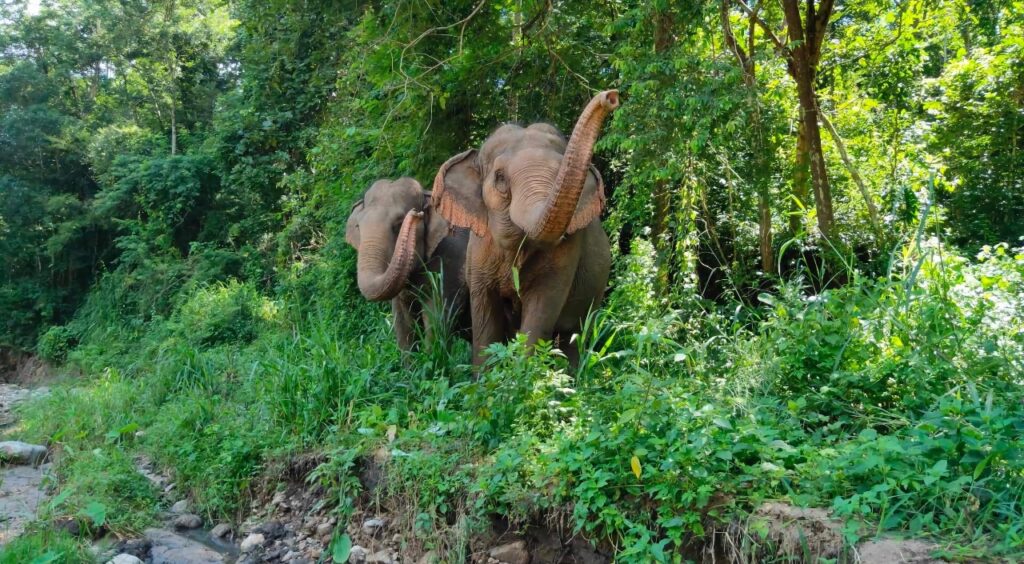
ChangChill
Chiang Mai
It may come as a surprise, but ChangChill (meaning relaxed elephants) didn’t always have the elephants’ best intentions at heart. Before 2017, the sanctuary allowed riding, bathing, and feeding activities but realized this wasn’t the best for the elephants. With the help of the World Animal Protection Organization and other travel companies, they shifted to an ethical model that allows elephants to be free from abuse and exploitation.
A visit here is extraordinary. After a briefing about the elephants, you trek into the jungle with a small group and a guide. During the hike, the guide shares information about the elephants and shows you signs that the elephants have been around or maybe near. Sometimes, you may hike a bit before spotting one, as there is no guarantee of where they will be. You could catch them munching on leaves, bathing in the river, or playing in the dirt.
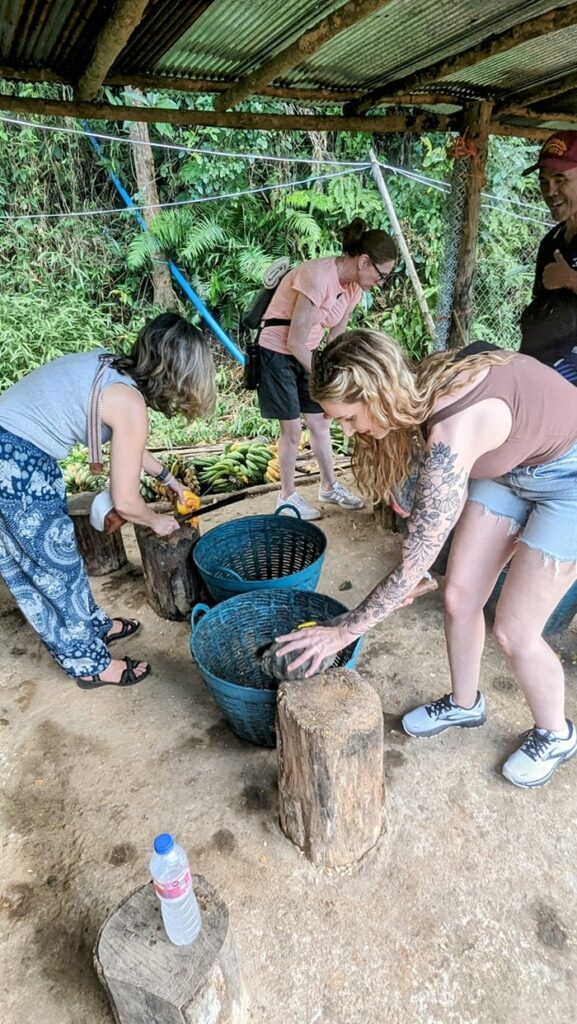
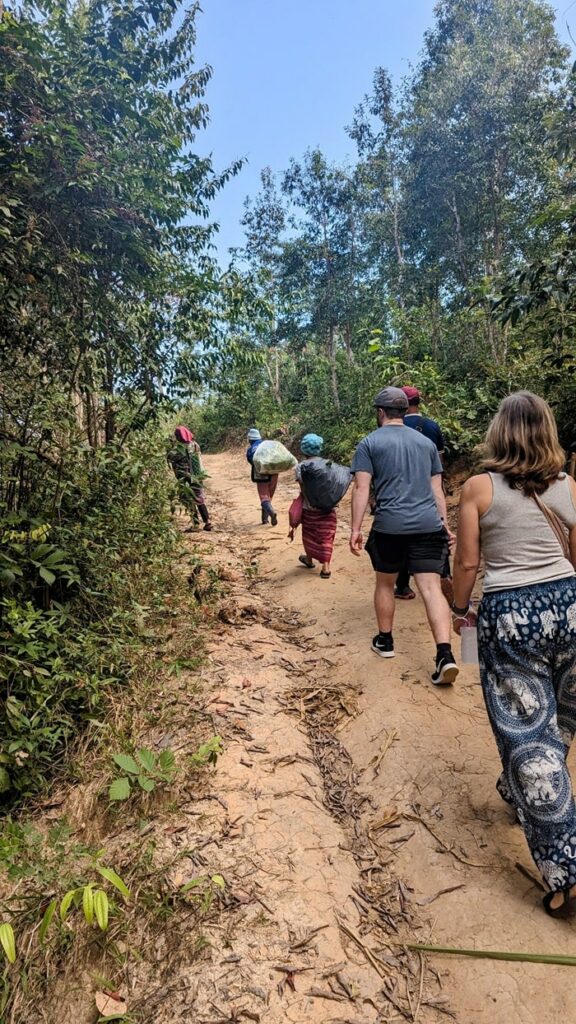
ChangChill offers full-, half-, and two-day visit options, all of which include observation treks to see the elephants. Additional activities include preparing elephant snacks, cooking class, herb lesson, or visiting the local Karen village.
During your visit, you will have the opportunity to meet with the elephant’s mahouts. These individuals become the elephant’s friend and bodyguard, which allows them to share all sorts of interesting information about the elephant’s behaviors, history, and more. Currently, four elephants call ChangChill home, and all have been rescued from tourism or the logging industry. Our vegan tour through Thailand often visits this sanctuary.
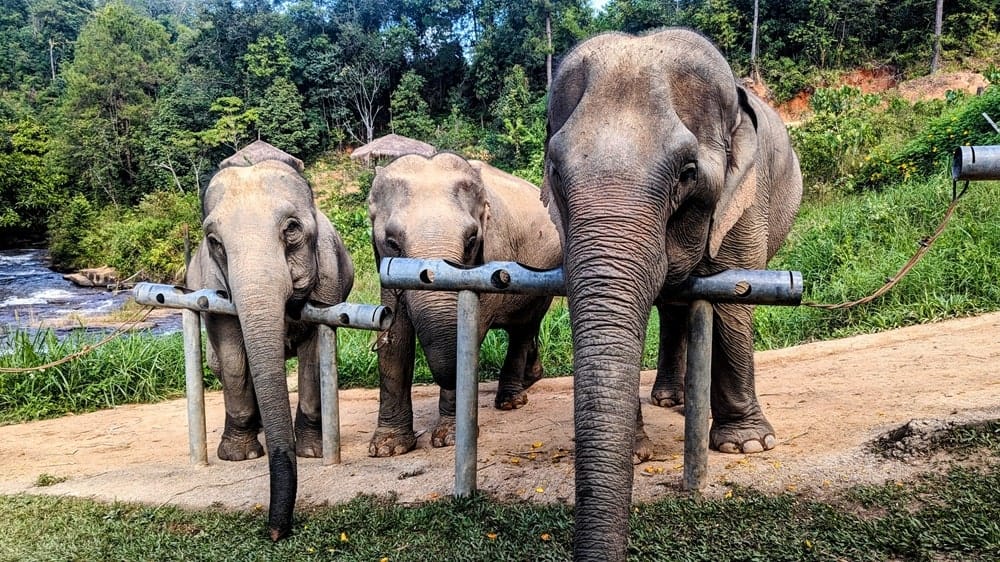
Kindred Spirit Elephant Sanctuary
Chiang Mai
Located in the picturesque mountains of Chiang Mai, this sanctuary is dedicated to bringing elephants back to their natural habitat and promoting ethical tourism.
Visitors at Kindred Spirit Elephant Sanctuary can expect to see elephants roaming freely in the forest, living as naturally as possible. The sanctuary offers a homestay program where guests stay with local Karen families in basic accommodations, providing a genuine cultural experience. This includes learning about Karen culture, participating in local activities, and enjoying meals made from locally sourced ingredients.
They also offer longer-term opportunities for those interested in deeper involvement. Volunteers and interns can participate in elephant research, community projects, and conservation efforts, gaining valuable experience and contributing to the sanctuary’s mission. They don’t offer opportunities to visit for a half or full day; the shortest visit is two days.
No matter what you choose, your visit will include hiking through the forest to locate the elephants and observe their natural behaviors. You’ll witness these majestic creatures in their natural environment, contributing to their welfare and conservation through their visit. Kindred Spirit is home to seven beautiful elephants.
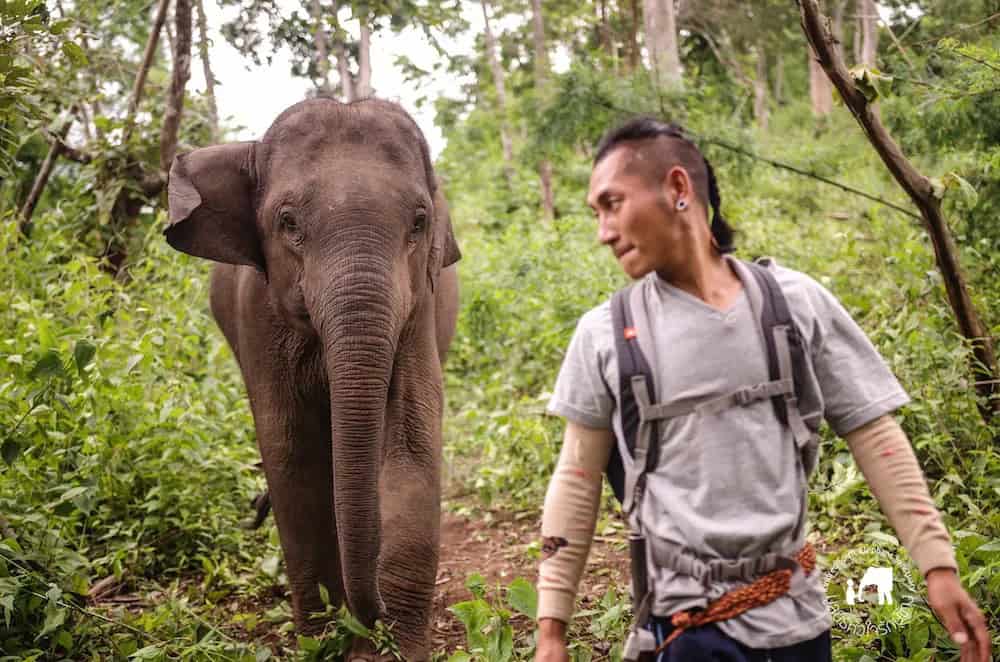
Mahouts Elephant Foundation
Two hours north of Mae Sot in a Karen community on the border between Thailand and Myanmar
Located in a remote Karen village near the Myanmar border, the Mahouts Elephant Foundation began as a way to not only protect the elephants from abuse but also to protect Karen indigenous mahouts.
The family behind this wonderful organization realized that the industries exploiting the elephants also exploited the mahouts and forced them into a poverty trap. The Foundation created a program that provided the mahouts with the tools they needed to support their families, making it unnecessary for them to sell the elephants into abuse.
Through their partnerships, they offer a variety of unique experiences, such as yoga and breathwork retreats, as well as multi-day experiences to learn about the elephants and the local Karen community. On a multi-day adventure, you’ll stay with a local family to experience traditional village life and participate in daily activities such as traditional weaving and bamboo basket making. Daily excursions into the forest provide opportunities to learn about the elephants’ habitat and their symbiotic relationship with the environment and the local community.
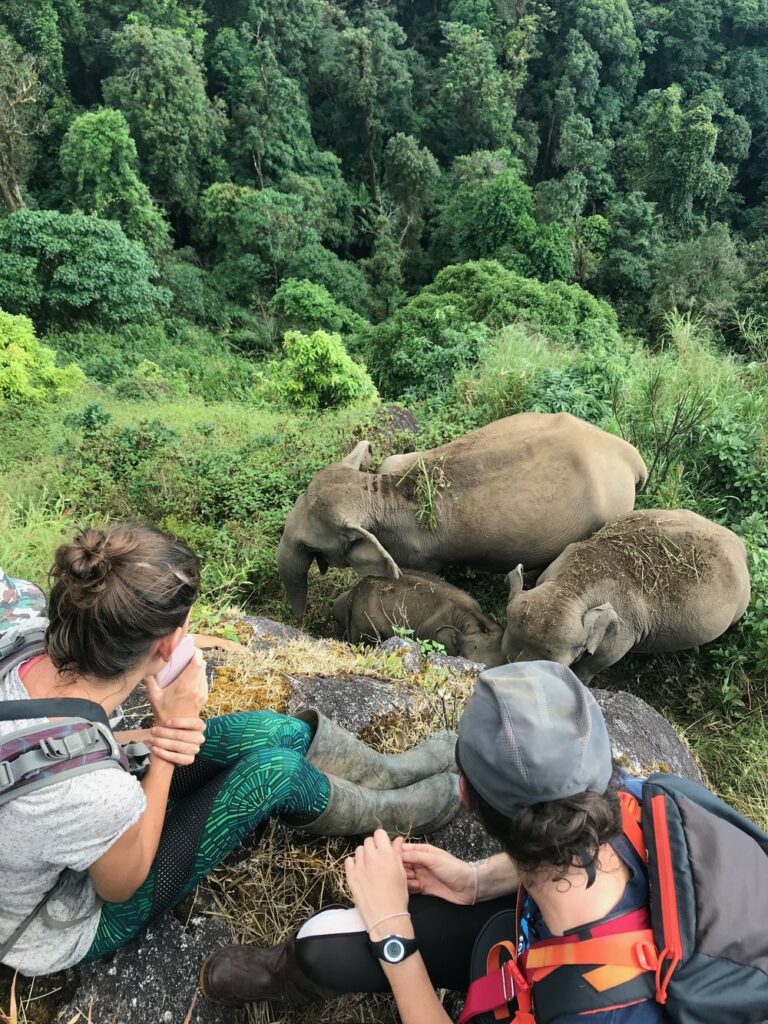
For students interested in learning more or who are interested in working in conservation, you should check out their four-week field course. The course provides the opportunity to get involved with an ongoing research project studying the behavior and ecology of re-wilded Asian elephants in their natural habitat.
Boon Lott’s Elephant Sanctuary
Sukhothai
Like most of the sanctuaries on this list, Boon Lott’s (BLES) was founded to protect elephants from exploitation, but BLES is also in memory of one very special baby elephant. Katherine Connor started the sanctuary after desperately trying to save a three-month-old calf and his mother. Although the little guy was tough, he wasn’t strong enough to make it and passed away, but his memory and story are what drive Katherine and her team to try to protect others.
You can expect a unique, hands-off experience where direct interaction with the elephants is limited to observing them in their natural habitat. The sanctuary promotes a serene environment, allowing elephants to engage in natural activities like foraging, grazing, and socializing with other elephants. Daily activities include walking with the elephants in the forest, learning about their behaviors and needs, and engaging in authentic cultural exchanges with the local mahouts and their families. BLES is currently home to 10 rescued elephants.
BLES doesn’t offer full-day or half-day tours, only multi-day stays. It’s recommended to stay at least two nights, but many stay up to five, arriving on Monday and departing on Friday. Your stay includes accommodations at a nearby guesthouse, all meals, and transportation. During your stay, you’ll have the opportunity to observe and learn more about the elephants and spend time with the local community. The sanctuary relies on the income from guests to continue its vital work in elephant conservation and community support.
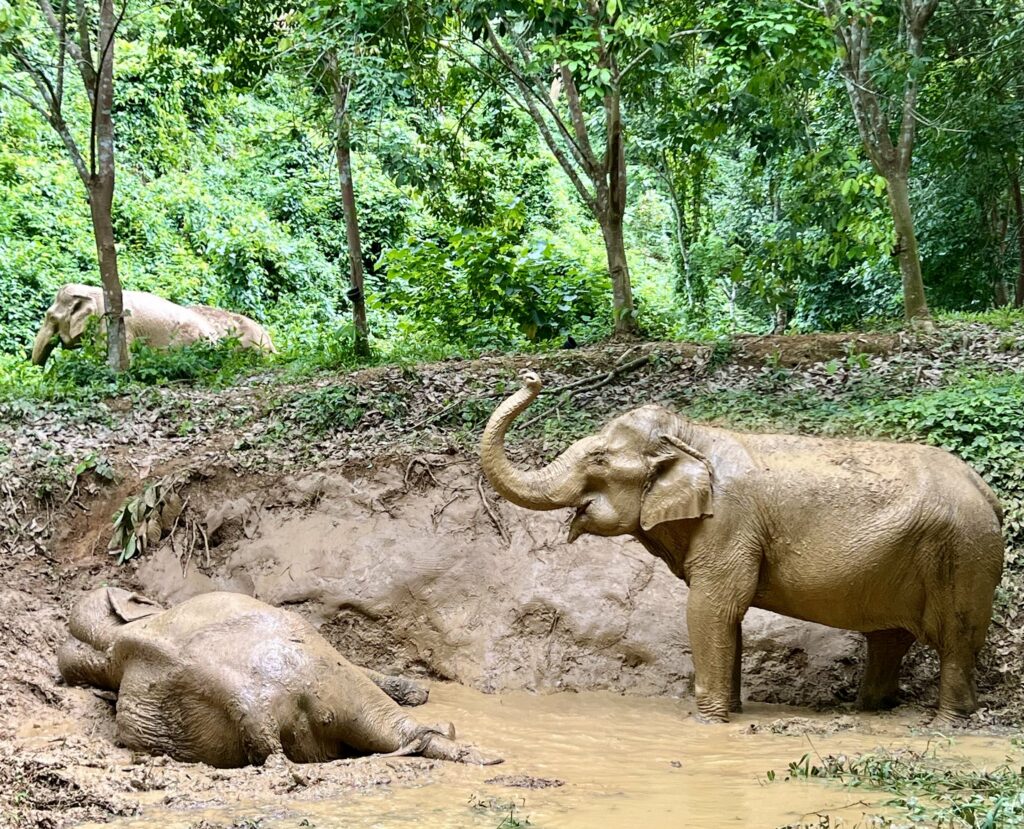
Following Giants
Krabi & Koh Lanta
Although it’s unfortunately popular to find elephant riding camps in Southern Thailand, the founder of Following Giants wanted to create an alternative. They started by educating visitors about the mahout culture and elephant behavior and, from there, partnered with World Animal Protection to create a fully elephant-friendly business model.
You can expect a hands-off approach where the primary activity is observing elephants as they roam freely, graze, and bathe in their natural habitat. The sanctuary emphasizes education, allowing visitors to learn about elephant behavior, their natural environment, and the ongoing conservation efforts.
Both the sanctuaries in Krabi and Koh Lanta offer a variety of programs. You can visit for a half or full day, which includes a jungle walk to observe the elephants and help make elephants snacks, and if you stay all day, you’ll have the opportunity to go kayaking or on a waterfall hike. At the sanctuary in Koh Lanta, there is an opportunity to volunteer for a week, which allows you to learn more about these beautiful giants and help with tasks like general maintenance, preparing elephant food, reforestation projects, and more.
Somboon Legacy Foundation
Kanchanaburi
Somboon is a fabulous website to discover when you’re looking for ethical elephant sanctuaries in Thailand. It clearly (with photos) outlines what is acceptable and responsible tourist activity and what is not. When looking for ethical wildlife activities, I always encourage people to look for photos, as they often tell the story better than words.
Located near Kanchanaburi, approximately an hour and a half from Bangkok, Somboon emphasizes education and rehabilitation, ensuring that elephants are free from the stress and exploitation common in many tourist-oriented establishments.
The sanctuary offers several programs ranging from half-day to overnight stays. During these visits, you can observe elephants in their natural environment, learn about their history, and participate in activities such as preparing food for the elephants and visiting the unique Interactive Elephant Museum. This museum provides an engaging educational experience for children and adults and aims to raise awareness about elephant conservation. Somboon is currently home to three rescued elephants.
How to Tell if an Elephant Sanctuary is Ethical?
I wish I could tell you that there is a simple way to determine which sanctuaries are operating in the best possible manner. Unfortunately, it can be really tricky.
Here are a few red flags to look for when choosing an elephant sanctuary:
- You’re allowed to ride the elephants.
- You’re allowed to touch or bathe the elephants.
- The elephants are kept in confined spaces and can’t roam freely.
- There are baby elephants on the property (unless this is an orphanage for rescued elephants, a sanctuary should never promote breeding).
- The elephants perform tricks (like painting or kicking a ball).
Now, a business will not outline all of the ways it isn’t operating ethically, so it’s essential to do your research. Aside from checking out their website, look at reviews on TripAdvisor and Google. See what people say about their experience and what they could and could not do. Also, look at the photos people post — often, the photos can tell you as much as the reviews can. When in doubt, choose another location.
I often tell people that if it’s an activity you wouldn’t do in the wild, don’t pay for it. You’d never approach an elephant for a hug or to bathe it in the jungle, so you shouldn’t do it in any other setting.
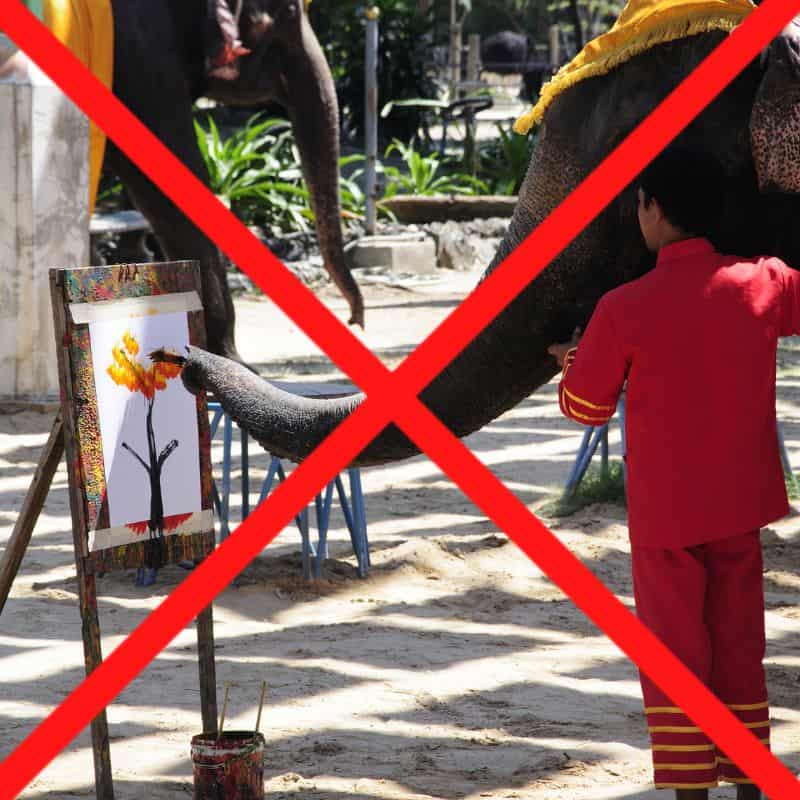
Is this a normal elephant activity?
Elephants have to be trained (or abused) to perform tricks like painting, kicking a ball, or balancing on a platform.
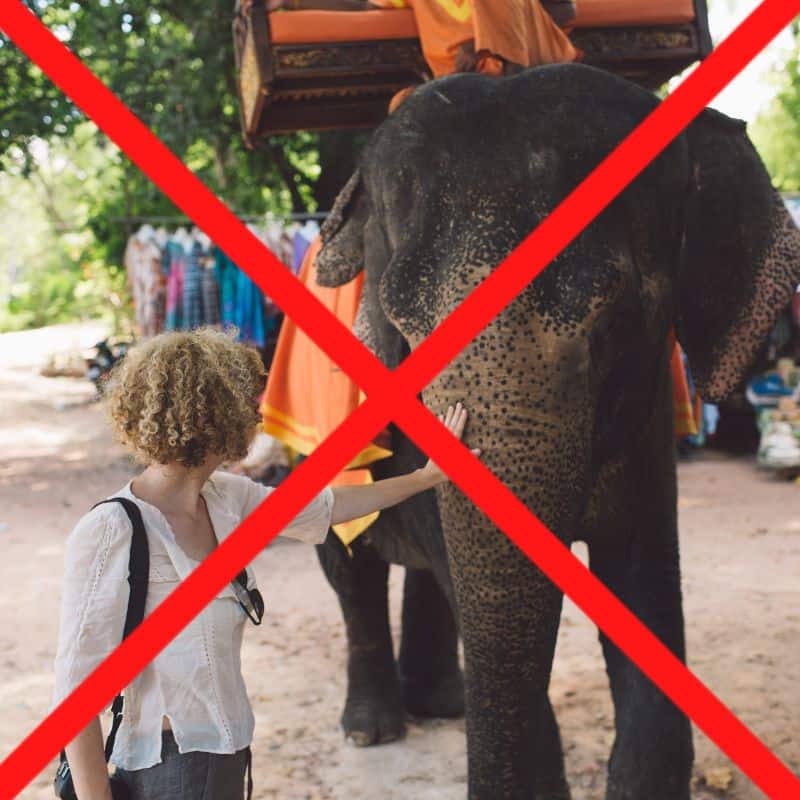
It might seem innocent…
You’d never pet an elephant in the wild, so don’t do it elsewhere. These activities can cause stress & prioritize profit over the elephant’s well-being.
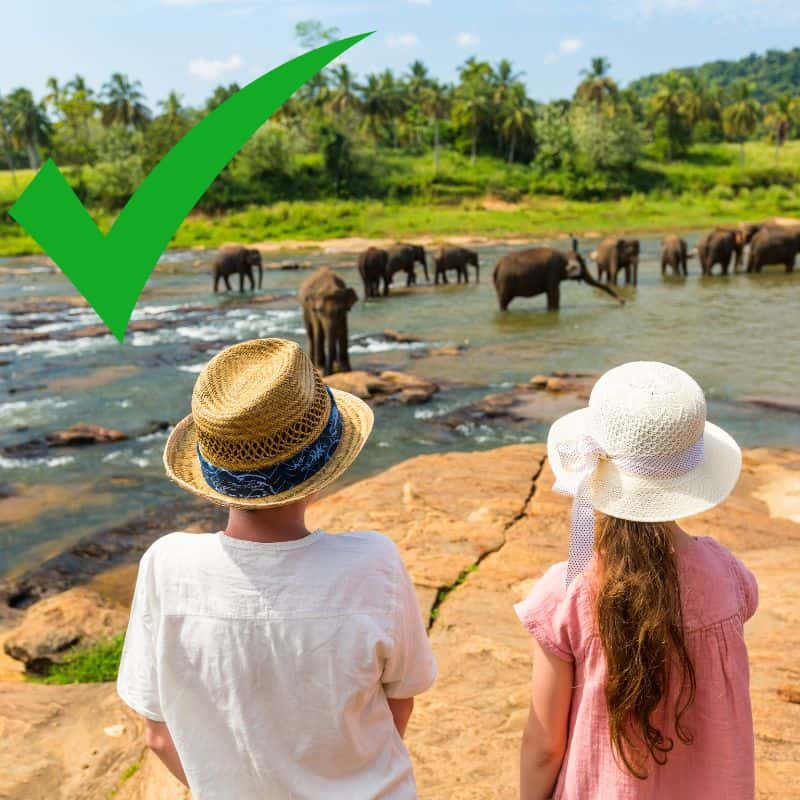
Allow elephants to be elephants
Ethical activities include ones that allow elephants to roam freely in their natural habitat, while humans observe from a distance.
Is Riding an Elephant Ever Ethical?
It’s absolutely never ok to ride an elephant. Young elephants are taken from their mothers to undergo a training process called “the crush” or “phajaan.” It involves cruel tactics that include physical and psychological abuse, such as isolation, sleep deprivation, starvation, and beatings using tools like bullhooks or electric prods to make the elephant submissive.
In addition, an elephant’s spine is not designed to support the weight of humans or a saddle/chair. Carrying weight on their backs can lead to long-term injuries, including spinal damage and joint problems.
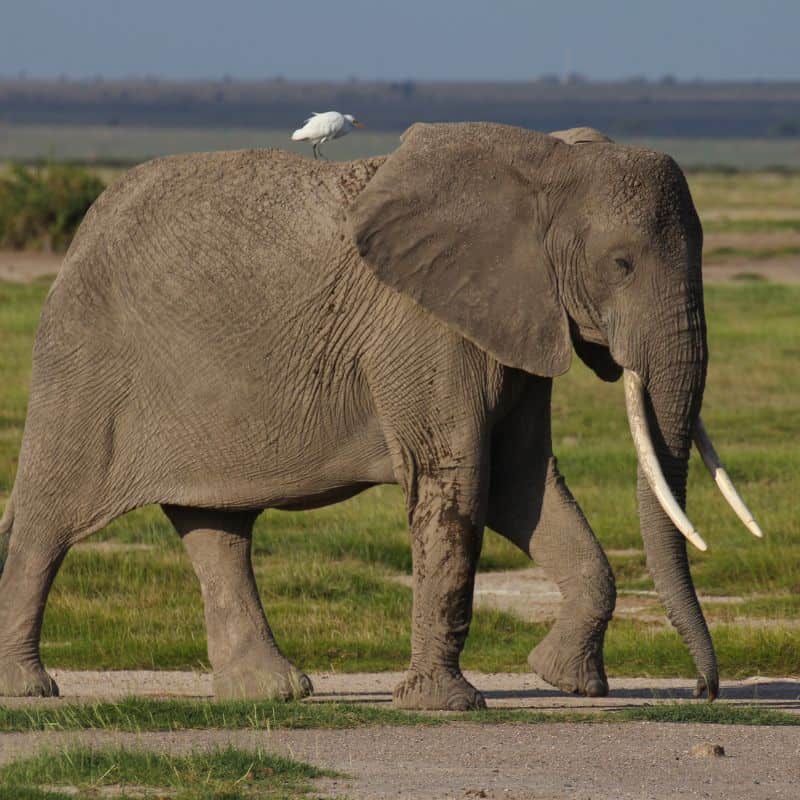
Why Shouldn’t You Bathe an Elephant?
Although these may seem like incredibly innocent activities, they are unfortunately laden with cruelty. Just imagine a 10,000-pound elephant standing still for hours while tourists pour water over it and cover it with mud. Do you think an elephant would naturally allow this in the wild? The answer is no, and the only way the animal allows that is because it has undergone cruel training to keep it under control, which means the elephant fears violence if it doesn’t behave.
The activity can also be incredibly unhygienic. If you stand in a river or pool of water for an extended amount of time, the elephant will go to the bathroom, which means you’re essentially standing in a toilet.
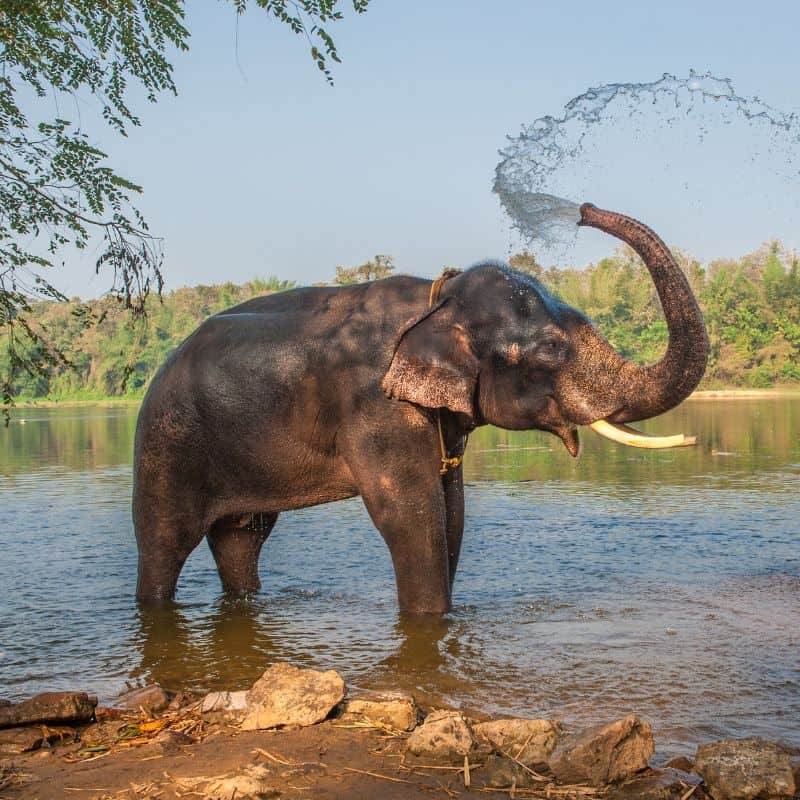
More Vegan Travel Help
Now that you now which elephant sanctuaries in Thailand are ethical, you’ve got to plan the rest of your adventure. These guides and articles will be helpful!

